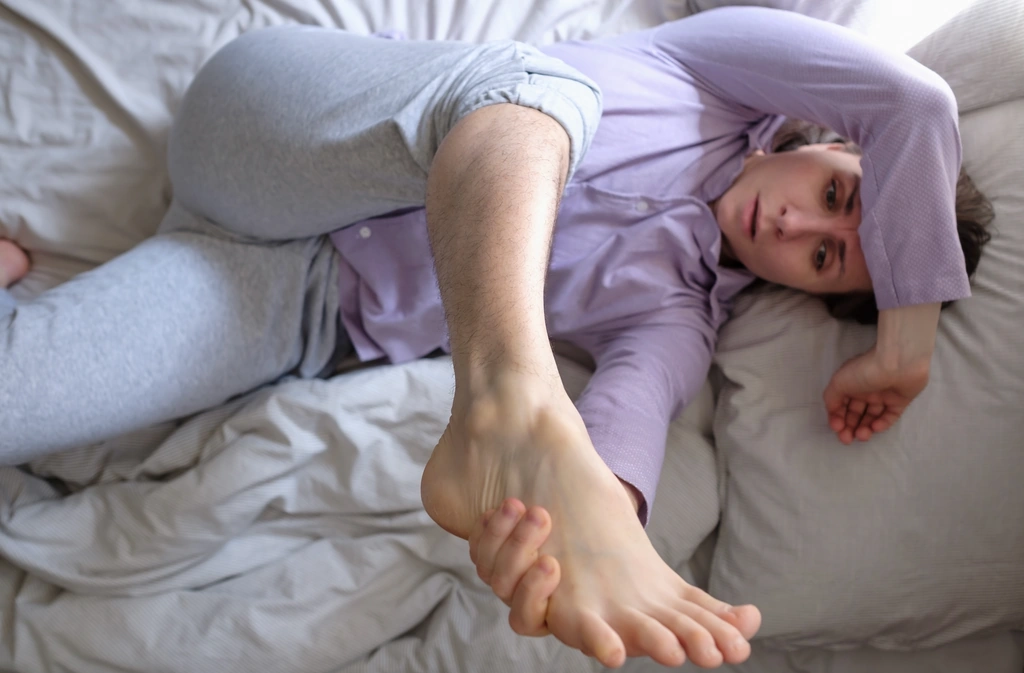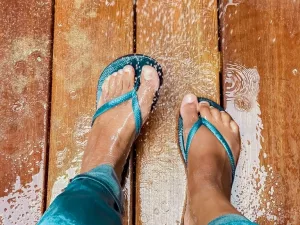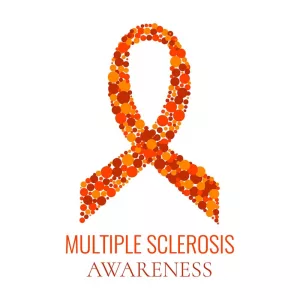
When Sleep Feels Like a Battle
Ever had one of those nights where it feels like your own body is plotting against you? The lights go out, the day finally quiets down… yet your feet or hands just buzz, tingle, or burn like a smoke alarm on repeat. If you live with peripheral neuropathy, you already know: sleep doesn’t come easy.
But this isn’t just another dry list of “tips.” Consider this more like swapping secrets with a friend who’s been there, tried all the tricks, and still manages to find a little humor in the wild world of chronic nerve pain. Let’s talk plain and get you some comfort. Sound good?
Why Is Night So Much Worse?
Have you ever noticed the pain becomes more intense as soon as your head hits the pillow? It’s not just you — and you’re definitely not imagining things. Here’s the scoop: during the hustle of the day, your brain is busy juggling a million things. Distractions actually help muffle your nerve pain. Then, bedtime rolls around; the world is quiet and your nerves start shouting for attention (Why is my neuropathy worse when I lay down).
Plus, cooler night temps can slow your circulation, especially in hands and feet, cranking up the tingling or burning. Heck, even your sleeping position can pinch or compress nerves without you realizing. I still remember my first night with neuropathy; it felt like a thousand tiny ants parading in my socks. Fun times…
What If It’s Your Position?
This sounds almost too simple, but how you sleep can make a huge difference. If you curl up tight, sleep on your belly, or even hug yourself like a pretzel, you might be squishing nerves or blood vessels, amping up the pain. Ever wake up with your hand numb and tingling? Same idea — just now it’s your feet, your legs, or maybe both (research on sleep positions and nerve pain).
Quick Table: Day vs. Night Pain
| Factor | Daytime | Nighttime |
|---|---|---|
| Distractions | Work, chores, screens | Silence, worry, awareness |
| Temperature | Usually warmer | Colder (slower circulation) |
| Movement | On your feet, shifting | Still, compressed joints |
Your Bedtime Routine: More Than Just “Go to Bed”
Let’s talk about how you prepare for sleep. Not just crashing as soon as you’re tired, but an actual routine — one that gives your nervous system a nudge to settle down. Think of it like prepping the perfect mug of tea… slow, mindful, a little ritual that brings you back to yourself.
Start by ditching stimulants after noon. Caffeine and nicotine are like red bullies for your nerves; they heighten sensitivity and make falling asleep tougher (science-backed advice on sleep and neuropathy).
I know some people (myself included) who would kill for a giant mocha at night, but after one too many tingly, sleepless evenings? Herbal tea became my new ritual. Chamomile, lavender, valerian — simple, gentle, and shockingly effective.
Does Routine Really Help?
Okay, maybe you’re not a “routine person.” Neither was I, honestly… until I read about how much our bodies and nerves crave rhythm. Try going to bed and waking up at the same time every day — even weekends. It’s weirdly comforting for your nerves and can cut down that night-time pain spiral (How to sleep through nerve pain naturally).
Maybe throw in a warm bath, gentle stretching, or 10 minutes of reading. Consistent, calming cues tell your brain, “Hey, it’s safe to wind down.”
Friend’s Tip: My Tea Ritual
Skip the late-night cola or cigarette. Instead, make herbal tea part of your wind-down. It’s basic, I know, but sometimes you need to go simple before you go fancy. I started setting my phone alarm for “tea & no screens.” Made all the difference.
Sneaky Position Changes for Less Pain
Let’s be honest: sleep positions matter. You can’t out-meditate a pinched nerve or ignored numb toes, trust me. So, what can you do that’s actually doable?
The fan favorite: sleep with a body pillow between your legs (if you’re a side sleeper). Try sleeping flat on your back with a small pillow under your knees. If you’re struggling with hand or arm neuropathy, rest your arm on a cushion or pillow, not squished under your head.
One night, I tested three positions in one hour — side, back, curled up. Guess what? Flat on my back with a pillow under my knees cut my foot tingling in half. It’s not glamorous, but that’s neuropathy for you.
Are You Stuck in a Bad Position?
Think about how you wake up. Are you twisted? Limbs tingling? Try adjusting a little each night:
- Back sleepers: keep arms at your sides or rest hands gently on your belly.
- Side sleepers: hug a pillow and keep knees stacked, not crunched.
- Belly sleepers: honestly, try not to be one. Nothing good happens there.
Story Time: The Body Pillow Miracle
My cousin, who swore he couldn’t sleep except in the “lawn chair curl,” switched to hugging a body-size pillow. He said it was like someone turned the foot pain dial down from 10 to 4 — not perfect, but miles better.
And if you ever wondered Why is my neuropathy worse when I lay down, try tracking how you sleep and see if new positions help. Sometimes the small tweaks add up in big ways.
Natural Soothers: Gentle Tricks That Work
There’s no magic wand. But… I’ve tried nearly every home comfort move there is, and some are worth repeating:
- Warmth: A warm (not hot!) foot soak before bed loosens tight nerves and muscles. Bonus: feels like a mini spa night (natural treatments overview).
- Cooling: When the burning is intense, a cold gel pack (wrapped in a light cloth) can numb things down, even briefly.
- Stretching/massage: Gentle foot or hand massage — fast, light, easy. Don’t overdue deep pressure; think “petting a sleeping cat.”
- Vitamin B: A daily B-complex (B1, B6, B12) may help nerve repair, especially if your neuropathy is diet-related. Always double check with your doc first (why vitamins matter for nerve health).
But What About Herbs and Oils?
Some folks swear by herbs (turmeric, cayenne, holy basil) or essential oils like lavender. Honestly, results vary. For me, a little lavender oil in a diffuser and gentle stretching worked way better than any fancy “miracle” cream. Always dilute oils and check with your doctor, especially if you’re on other meds.
Real-Life Mini-Table: Quick Comfort Hacks
| Comfort Hack | Why It Helps | How to Try |
|---|---|---|
| Warm Bath | Boosts blood flow | 10-15 min, evening |
| Body Pillow | Reduces nerve stress | Between knees, support limbs |
| Herbal Tea | Soothes nerves | Chamomile or valerian, nightly |
| Gentle Stretch | Relieves tension | Simple foot/arm flexes |
If you want more strategies, check out How to sleep through nerve pain — there are some surprisingly creative suggestions there!
Crafting Your Sleep Cave (Environment Matters!)
Your bedroom isn’t just a place to drop. The vibe, temperature, and lighting matter way more than you might think. For example, keeping your room cool (around 65-68°F or 18-20°C) actually helps with nerve pain. Too hot, you’ll toss and sweat; too cold, you might stiffen up… but cool and comfy? It’s the Goldilocks zone (expert discussion on sleep environments).
Keep it dark. Use blackout curtains, and ditch nightlights or screen glow as much as possible — blue light really does mess with your melatonin (the sleep hormone). Toss the phone or tablet at least an hour before bed. If you need a wind-down, try journaling or reading something light.
Rituals Make It Real
Stacked up, these little habits work. Make your bed in the morning so climbing in at night feels like a treat. Even spritzing lavender on your pillow can make the room feel more like a retreat and less like a sick room.
A friend who battled cancer-related neuropathy said, “I started treating my bedroom like a sanctuary, not a storage unit. Somehow, my pain went from front-row seat to background noise.”
Mind-Body Moves: Relaxation You’ll Actually Want
Nerves love stress. (Said no one ever, but it’s true.) Mindfulness, nighttime meditation, or even slow, deep breathing can help you focus on something besides your feet. Try it right now: inhale for 4 seconds, hold for 4, exhale for 6. Feels silly? Maybe. But anything that breaks the pain-anxiety-pain cycle is worth a shot.
Progressive muscle relaxation — squeeze and release your toes, calves, thighs, working up the body — sounds basic, but it can gently fatigue tense nerves and help you drift off. Guided meditations for pain management are all over YouTube and podcast apps. Sometimes, you just need help turning the mental volume down.
Try, Tweak, Repeat: Your Real-Life Sleep Puzzle
Some nights, nothing works. That’s real. Neuropathy is complicated, and your “perfect” plan might hit a wall. But don’t give up. Track what you try. Maybe that gel sock was useless, but a warm bath shifted everything. Maybe the pillow trick bombs, but tea and breathing helps you slip under a bit easier.
One old-school trick: log your pain and sleep quality for a week (just jot a few words each morning). See patterns so you can stack the things that actually help — and toss what doesn’t.
If your sleep is still a disaster despite all this? Please talk to your doctor. Sometimes underlying issues like diabetes, sleep apnea, or medicines need attention or adjustment. Getting those squared away gives you more room to experiment with natural tweaks.
And, if you’re desperate, revisit How to sleep through nerve pain and Why is my neuropathy worse when I lay down — sometimes just seeing someone else’s story gives you that little nudge to keep tweaking.
Wrapping Up: Hopeful Nights (Yes, Really)
So here’s the deal: learning how to sleep with peripheral neuropathy isn’t just about hacks or perfect routines. It’s deeply personal, sometimes frustrating, and… it’s never hopeless. Start small. Maybe tonight you just swap out your pillow for a softer one and sip a mug of calming tea. Tomorrow, tweak your sleep setup or experiment with stretches.
Remember, nights aren’t ruined forever. Your nerves might be noisy, but over time, the right mix of comfort tweaks, routines, and persistence will tip things in your favor. Bad nights happen. Good nights return. Keep trying, stay curious, and don’t forget to laugh at the messiness of it all — because sleep, like life with neuropathy, is always a bit of a work in progress. Sweet dreams and gentle rest… you truly deserve both.

























Leave a Reply
You must be logged in to post a comment.